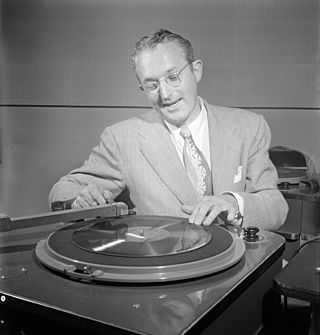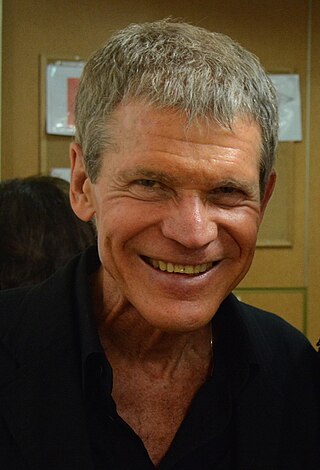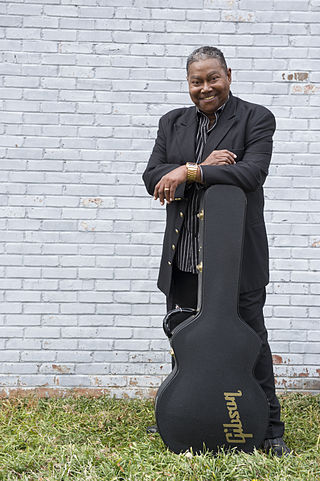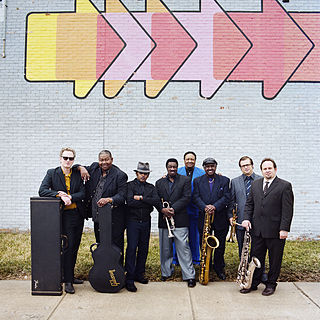Related Research Articles

The Original Dixieland Jass Band (ODJB) was a Dixieland jazz band that made the first jazz recordings in early 1917. Their "Livery Stable Blues" became the first jazz record ever issued. The group composed and recorded many jazz standards, the most famous being "Tiger Rag". In late 1917, the spelling of the band's name was changed to Original Dixieland Jazz Band.

Paul Allen Wood Shaffer is a Canadian singer, keyboardist, composer, actor, author, comedian, and musician who served as David Letterman's musical director, band leader, and sidekick on the entire run of both Late Night with David Letterman (1982–1993) and Late Show with David Letterman (1993–2015).

The NBC Symphony Orchestra was a radio orchestra conceived by David Sarnoff, the president of the Radio Corporation of America, the parent corporation of the National Broadcasting Company especially for the conductor Arturo Toscanini. The NBC Symphony Orchestra performed weekly radio broadcast concerts with Toscanini and other conductors and several of its players served in the house orchestra for the NBC Radio Network. NBC encouraged the public’s perception of the Orchestra as a full-time organization exclusively at Toscanini’s beck and call, but Fortune disclosed in 1938 that these instrumentalists played other radio—and, later, television—broadcasts: “the Toscanini concerts have been allocated only fifteen of the thirty hours a week each man works, including rehearsals.”

Booker T. & the M.G.'s were an American instrumental, R&B, and funk band formed in Memphis, Tennessee, in 1962. The band is considered influential in shaping the sound of Southern soul and Memphis soul. The original members of the group were Booker T. Jones, Steve Cropper (guitar), Lewie Steinberg (bass), and Al Jackson Jr. (drums). In the 1960s, as members of the Mar-Keys, the rotating slate of musicians that served as the house band of Stax Records, they played on hundreds of recordings by artists including Wilson Pickett, Otis Redding, Bill Withers, Sam & Dave, Carla Thomas, Rufus Thomas, Johnnie Taylor and Albert King. They also released instrumental records under their own name, including the 1962 hit single "Green Onions". As originators of the unique Stax sound, the group was one of the most prolific, respected, and imitated of its era.

Thomas Francis Dorsey Jr. was an American jazz trombonist, composer, conductor and bandleader of the big band era. He was known as the "Sentimental Gentleman of Swing" because of his smooth-toned trombone playing. His theme song was "I'm Getting Sentimental Over You". His technical skill on the trombone gave him renown among other musicians. He was the younger brother of bandleader Jimmy Dorsey. After Dorsey broke with his brother in the mid-1930s, he led an extremely successful band from the late 1930s into the 1950s. He is best remembered for standards such as "Opus One", "This Love of Mine" featuring Frank Sinatra on vocals, "Song of India", "Marie", "On Treasure Island", and his biggest hit single, "I'll Never Smile Again".

Artie Shaw was an American clarinetist, composer, bandleader, actor and author of both fiction and non-fiction.

Carl Hilding "Doc" Severinsen is an American retired jazz trumpeter who led the NBC Orchestra on The Tonight Show Starring Johnny Carson.

Theodore "Fats" Navarro was an American jazz trumpet player and a pioneer of the bebop style of jazz improvisation in the 1940s. A native of Key West, Florida, he toured with big bands before achieving fame as a bebop trumpeter in New York. Following a series of studio sessions with leading bebop figures including Tadd Dameron, Bud Powell, and Kenny Clarke, he became ill with tuberculosis and died at the age of 26. Despite the short duration of his career, he had a strong stylistic influence on trumpet players who rose to fame in later decades, including Clifford Brown and Lee Morgan.

Ian Ernest Gilmore Evans was a Canadian–American jazz pianist, arranger, composer and bandleader. He is widely recognized as one of the greatest orchestrators in jazz, playing an important role in the development of cool jazz, modal jazz, free jazz, and jazz fusion. He is best known for his acclaimed collaborations with Miles Davis.
Discography is the study and cataloging of published sound recordings, often by specified artists or within identified music genres. The exact information included varies depending on the type and scope of the discography, but a discography entry for a specific recording will often list such details as the names of the artists involved, the time and place of the recording, the title of the piece performed, release dates, chart positions, and sales figures.

David William Sanborn was an American alto saxophonist. Sanborn worked in many musical genres; his solo recordings typically blended jazz with instrumental pop and R&B. He began playing the saxophone at the age of 11 and released his first solo album, Taking Off, in 1975. He was active as a session musician, and played on numerous albums by artists including Stevie Wonder, Bruce Springsteen, Aretha Franklin, Sting, the Eagles, Rickie Lee Jones, James Brown, George Benson, Carly Simon, Elton John, Bryan Ferry and the Rolling Stones. He released more than 20 albums and won six Grammy awards.

Charles "Skip" Pitts was an American soul and blues guitarist. He is best known for his distinctive "wah-wah" style, prominently featured on Isaac Hayes' title track from the 1971 movie Shaft. He is widely considered to have been one of the architects of soul, R&B and funk guitar.

A session musician is a musician hired to perform in a recording session or a live performance. The term sideman is also used in the case of live performances, such as accompanying a recording artist on a tour. Session musicians are usually not permanent or official members of a musical ensemble or band.

Thomas "Bones" Malone is an American jazz musician, arranger, and producer. As his nickname implies, he specializes on the trombone but he also plays saxophone, trumpet, tuba, flute, and bass guitar. He has been a member of the Blues Brothers, Saturday Night Live Band, Blood, Sweat & Tears, and the CBS Orchestra, the house band for the Late Show with David Letterman.
George Sylvester "Red" Callender was an American string bass and tuba player. He is perhaps best known as a jazz musician, but worked with an array of pop, rock and vocal acts as a member of The Wrecking Crew, a group of first-call session musicians in Los Angeles. Callender also co-wrote the 1959 top-10 hit "Primrose Lane".
Brian Arthur Lovell Rust was an English jazz discographer.

The Bo-Keys are a soul jazz band from Memphis, Tennessee, formed as an homage to the city's rich musical tradition.

Four Star Favorites is a compilation album of phonograph records released in 1941 by Artie Shaw and His Orchestra on Victor Records, containing studio recordings by his second, third and fourth orchestras.
Joseph P. Lippman was an American composer, arranger, conductor, pianist, and songwriter working in jazz and traditional pop. His musical career was over five decades long, having started at age 19 with the Benny Goodman orchestra in 1934 and writing for television, films, and Broadway in the 1980s. He composed and arranged for Bunny Berigan, Jimmy Dorsey, Sarah Vaughan, Charlie Parker and worked as staff arranger in television for Perry Como and Hollywood Palace.

Harry Roy Gozzard was a Canadian-American jazz trumpeter. He first performed with Sam Donahue. Other members of Donahue's band included the former The Tonight Show Starring Johnny Carson bandleader Doc Severinsen, 1946 Esquire Award winner for Best New Female Vocalist Frances Wayne, Grammy Award-winning vocalist and actress Jo Stafford and popular music arranger Leo Reisman.
References
- ↑ Lanford, Jill J. (August 29, 1985). "House Bands: Music's Unsung Heroes". Spartanburg Herald-Journal . p. D1. Retrieved January 15, 2013.
- 1 2 3 Shipton, Alyn (8 July 2003). "House Band". In John Shepherd (ed.). Continuum Encyclopedia of Popular Music of the World Part 1 Performance and Production. Continuum International Publishing Group. p. 31. ISBN 9780826463227 . Retrieved 14 January 2013.
- ↑ Shuker, Roy (2012). Understanding Popular Music Culture (4th ed.). London: Routledge. p. 55. ISBN 978-0-415517133.
- 1 2 Decker, Todd (2011). Music Makes Me: Fred Astaire and Jazz (1st ed.). Berkeley: University of California Press. pp. 163–4. ISBN 978-0520268883.
- ↑ Dodd, Katie (January–February 2010). "Music of the Night" (PDF). M Music & Musicians. 1 (1). M Music Media, LLC: 28–32. ISSN 2156-2377 . Retrieved January 15, 2013.
- ↑ Deggans, Eric (March 1, 2009). "Revolutionizing late-night television". The Post and Courier via Tampa Bay Times . p. 2A. Retrieved January 15, 2013.[ permanent dead link ]
- ↑ "Philadelphia International Records Page". soulwalking.co.uk. Retrieved 7 October 2011.
- ↑ "Credits". Roland Chambers. allmusic . Retrieved 7 October 2011.
- 1 2 3 4 5 6 "Great White Way Orchestra". Discography of American Historical Recordings. Retrieved August 15, 2021.
- 1 2 3 "Metropolitan Orchestra". National Jukebox. Library of Congress. Retrieved 7 October 2011.
- ↑ "Victor Discography: Metropolitan Orchestra (Musical group)". Victor Library. Retrieved 7 October 2011.
- ↑ "Victor Military Band (Musical group)". Victor Library. Retrieved 7 October 2011.
- ↑ "Victor Military Band Discography". Victor Military Band. discogs. Retrieved 7 October 2011.
- ↑ "Victor Orchestra Personnel". The Mainspring Press Record Collectors' Blog. Mainspring Press. Archived from the original on 10 August 2011. Retrieved 7 October 2011.